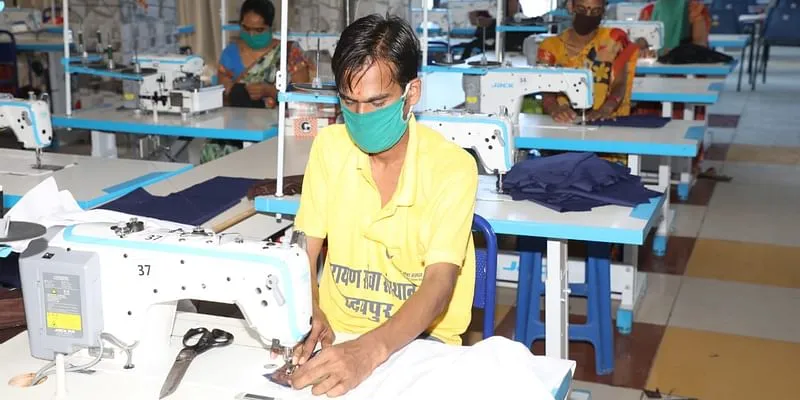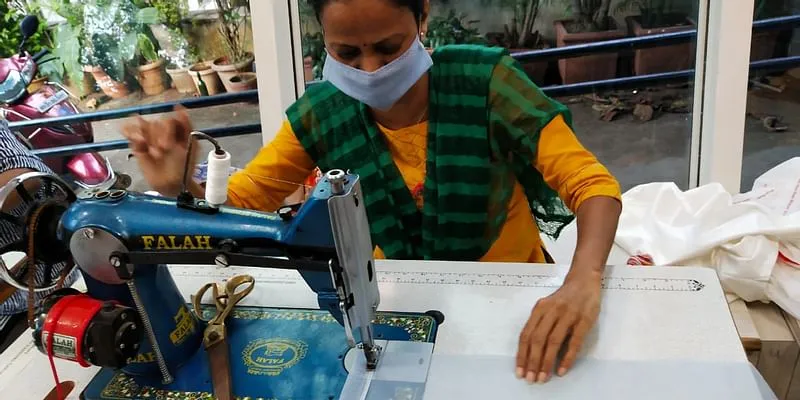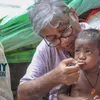From teaching farmers’ children to practising sustainable fashion – the top Social Stories of the week
This week, SocialStory saw entrepreneurs and NGOs focusing on sustainable fashion, education for farmer’s children, as well as the efforts put in to help the differently-abled community amidst a global pandemic.
This week, SocialStory witnessed the unfaltering efforts of Narayan Seva Sansthan, which has been physically, socially, and economically empowering the differently-abled community.
Meanwhile, we also found how veteran fashion designers Leena Singh of Ashima-Leena, and Rina Dhaka are encouraging sustainability in the fashion industry with the help of women-centric NGOs.
Here are the top Social Stories of this week:
Quitting job to educate children of drought-affected farmers in Maharashtra

Ashok teaching children at Snehwan.
Having grown up amidst parched lands in Maharashtra, Ashok Deshmane knew the struggles of sustaining in a drought. As years passed by, poverty, inaccessibility to education and healthcare, dry spells, and farmer suicides were still plaguing the residents. According to an RTI document, over 15,000 farmers lost their lives to suicide in Maharashtra between 2013 and 2018.
Wanting to improve this situation, he quit his well-paying job as a software engineer at Mphasis and established an NGO Snehwan to educate and provide for farmers’ children free of cost. With the help of his personal savings and some financial aid from his friends, he got the kids enrolled at good schools and also rented out a space to accommodate them.
Narayan Seva Sansthan's effort to empower differently-abled amid COVID-19

Members of NSS stitching masks and essentials.
Founded by Padma Shri Kailash ‘Manav’ Agarwal in 1985, Narayan Seva Sansthan (NSS) is on a mission to bring the differently-abled community to the mainstream society by empowering them physically, socially, and economically. Nestled in the Aravali Range, the NGO is situated in Badi village near Udaipur.
Over the last 35 years, the NGO has treated over four lakh patients, providing them socio-economic support with the best of the medical services, medicines, and technologies. It has two hospitals in Udaipur, with about 17 buildings and 1,100 beds.
Amidst the pandemic — with unemployment on the rise — NSS has been aiding unprivileged families with food and ration kits. It also set up various artificial limb camps for the differently-abled community.
The RE.purposed initiative reducing fashion wastes while fighting COVID-19

One of the artisans repurposing fabric
The fashion industry creates an estimated 92 million tons of textile waste each year. Every second, the equivalent of one garbage truck of textiles goes into landfills or is burned, globally. But, on the sunny side, there is a growing demand for sustainable clothing produced through non-polluting raw materials and zero-waste production facilities.
To aid that concept, a sustainable fashion COVID-19 response campaign called ‘RE-Think. Act. Create’ launched the ‘RE.purposed’ initiative. This initiative drives awareness among consumers and fashion stakeholders about social equity, slow fashion, the rich Indian textile heritage, and fashion choices’ impact on climate.
To support and act upon the cause, veteran fashion designers Leena Singh of Ashima-Leena, and Rina Dhaka have moved to encourage sustainability in the fashion industry, and are leading this initiative in association with women-centred NGOs, Srujna and Myna Mahila Foundation.
Vigocare offering remote health monitoring services through a connected care platform

The leadership team of Vigocare.
According to the Economic Survey released in 2019-20, the doctor-patient population ratio in the country is 1:1456, as oppose to the WHO recommended 1:1000. In fact, this ratio is much lower in rural areas. Not only does this tend to deteriorate the quality of healthcare provided to people at large but also puts a strain on the doctors and nurses.
Hyderabad-based startup Vigocare is attempting to bridge these gaps by offering remote monitoring services through a ‘Connected Care’ platform. Founded by Dr Shekar Chennupati and Ratish Bhat in 2018, the healthtech startup leverages AI, cloud technology, biosensor devices, and a dedicated command centre to equip patients and doctors with accurate health data.
Harnessing the power of young India for a better tomorrow

A Swasth Bharat Prerak seen interacting with young children
In the last five years, over 800 youngsters fanned out across India to implement the Zila Swachh Bharat Prerak (ZSBP) and Swasth Bharat Prerak (SBP) programmes. These youngsters helped achieve more than 99 percent coverage of sanitation in rural India. They also helped in increasing the efficiency of the government’s nutrition network significantly by bringing in innovation and context-based solutions.
Several innovation proposals written by Preraks brought specific support to the supplementary nutrition programme, data-driven monitoring, and diversified use of data to improve growth monitoring efficiency. While some initiatives are in the pilot phase, many have been adopted by states to implement at scale.
Edited by Suman Singh










